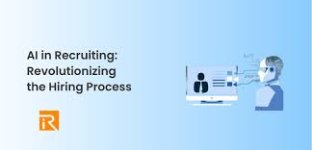The hiring landscape is undergoing a radical transformation, thanks to the growing influence of Artificial Intelligence (AI). Organizations worldwide are now integrating AI-powered tools into their recruitment processes to enhance efficiency, eliminate bias, and improve candidate experiences. As businesses strive to attract top talent in an increasingly competitive market, AI is proving to be a game-changer in reshaping how companies find and evaluate potential employees.
Traditional recruitment has long been criticized for being time-consuming, biased, and inconsistent. HR professionals often spend hours sifting through hundreds of resumes manually, leading to delays, fatigue-based errors, and sometimes, overlooked talent.
In contrast, AI offers automation, speed, and objectivity. Tools powered by machine learning can analyze thousands of resumes in seconds, shortlist the most relevant candidates based on pre-defined criteria, and even predict a candidate’s cultural fit or job success using predictive analytics.
However, the adoption of AI in recruitment isn’t without challenges. Algorithms are only as good as the data they are trained on. If the training data includes past hiring biases (e.g., favoring certain genders or schools), the AI can unintentionally reinforce those patterns.
There’s also a growing concern over privacy and transparency. Candidates often don't know they are being assessed by AI or how the system makes its decisions. Companies must ensure ethical practices, transparency, and candidate consent when using such tools.
AI is undeniably transforming recruitment, making it faster, fairer, and more strategic. However, businesses must approach this transformation responsibly, ensuring the technology serves as an aid, not a replacement, for human judgment. As the workforce continues to evolve, those who embrace AI smartly and ethically will stand out as future-ready employers.
The Traditional vs. AI-Driven Hiring Process
Traditional recruitment has long been criticized for being time-consuming, biased, and inconsistent. HR professionals often spend hours sifting through hundreds of resumes manually, leading to delays, fatigue-based errors, and sometimes, overlooked talent.
In contrast, AI offers automation, speed, and objectivity. Tools powered by machine learning can analyze thousands of resumes in seconds, shortlist the most relevant candidates based on pre-defined criteria, and even predict a candidate’s cultural fit or job success using predictive analytics.
Key Applications of AI in Recruitment
- Resume Screening
AI-based Applicant Tracking Systems (ATS) automatically scan resumes, highlighting those that best match the job description. These systems consider experience, skills, education, and even phrasing to rank candidates—saving time and effort for hiring managers. - Chatbots and Candidate Engagement
AI chatbots are revolutionizing candidate engagement by providing instant responses to FAQs, scheduling interviews, and keeping candidates informed throughout the hiring process. This leads to a better candidate experience and helps maintain engagement with potential hires. - Video Interview Analysis
Some platforms now use AI to analyze video interviews, detecting voice tone, body language, and facial expressions to gauge honesty, confidence, and other traits. While controversial, it’s gaining traction in assessing soft skills. - Bias Reduction
One of the biggest promises of AI is its ability to reduce unconscious human biases. By focusing on data-driven factors rather than human assumptions, AI can help companies build more diverse and inclusive teams—provided the algorithms are trained on unbiased data.
Benefits for Organizations
- Faster Hiring Cycles: AI dramatically cuts down the time-to-hire.
- Cost Efficiency: Automating repetitive tasks reduces the need for manual HR efforts.
- Improved Candidate Quality: Advanced filters and predictive analytics help identify the most suitable candidates.
- Scalability: AI tools can handle large volumes of applications effortlessly.
Challenges and Ethical Considerations
However, the adoption of AI in recruitment isn’t without challenges. Algorithms are only as good as the data they are trained on. If the training data includes past hiring biases (e.g., favoring certain genders or schools), the AI can unintentionally reinforce those patterns.
There’s also a growing concern over privacy and transparency. Candidates often don't know they are being assessed by AI or how the system makes its decisions. Companies must ensure ethical practices, transparency, and candidate consent when using such tools.
Conclusion
AI is undeniably transforming recruitment, making it faster, fairer, and more strategic. However, businesses must approach this transformation responsibly, ensuring the technology serves as an aid, not a replacement, for human judgment. As the workforce continues to evolve, those who embrace AI smartly and ethically will stand out as future-ready employers.

